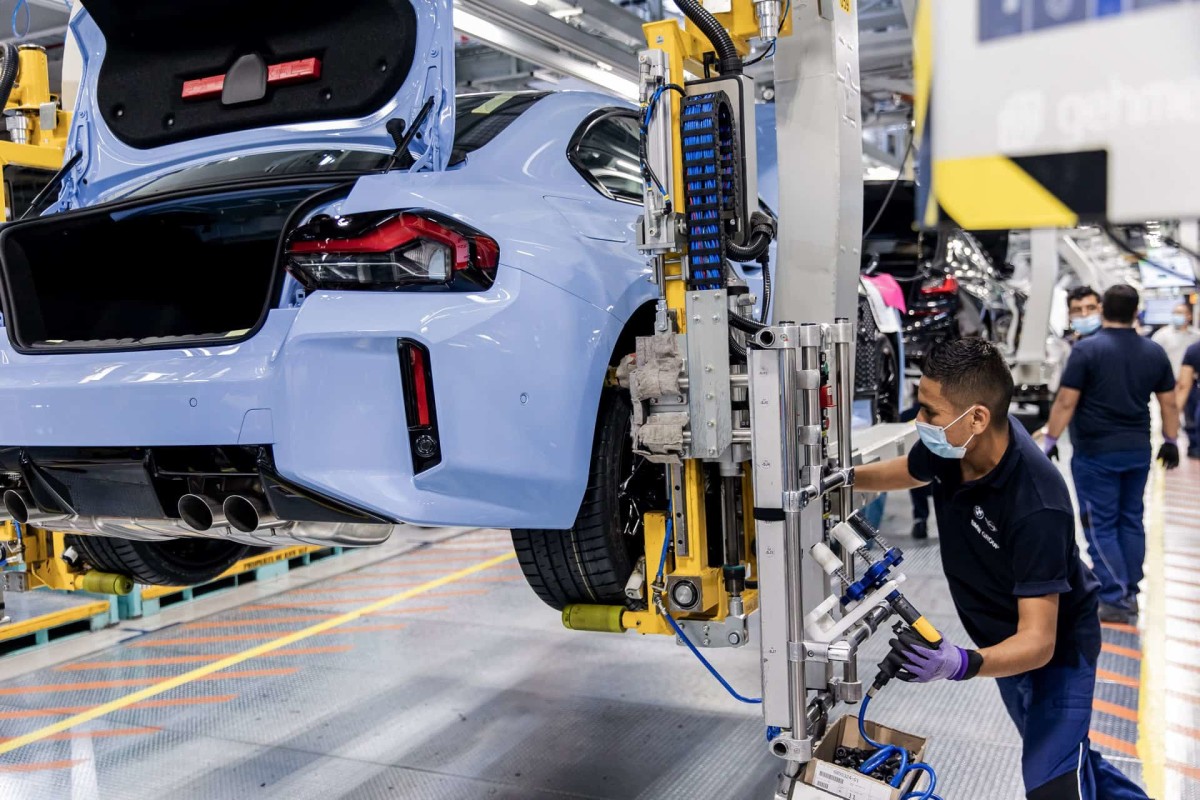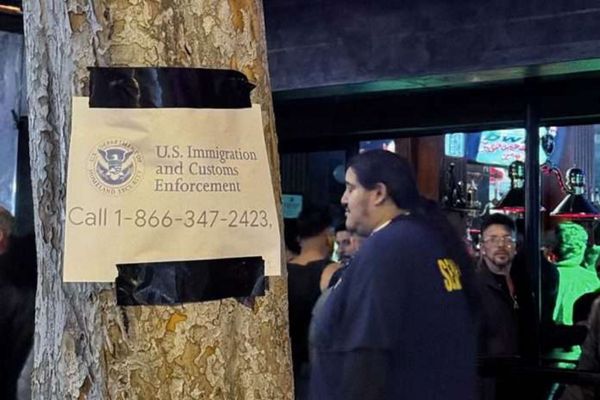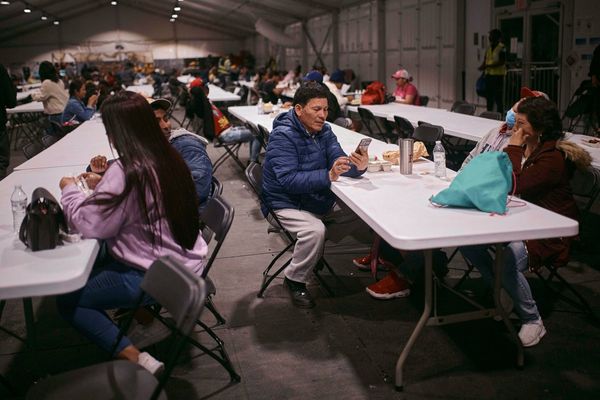
Whether they like it or not, a bitter pill that many patriotic, flag-waving Americans will have to swallow is that many of the cars made by their favorite Detroit automakers are not 'American' in terms of where they are made.
Though Detroit's Big Three has in the past competed against cars built in East Asian countries like Japan and now China, many of the models that the Big Three builds to compete against them are built thousands of miles away from Dearborn, Flint, and Toledo.
💰💸 Don’t miss the move: SIGN UP for TheStreet’s FREE Daily newsletter 💰💸
In fact, they are built in a country right next door: Mexico.
While the Big Three and a wide array of its competitors, like Toyota, Honda, and BMW, have enjoyed the benefits of Mexican manufacturing provided by the US-Mexico-Canada Agreement (USMCA) and the North American Free Trade Agreement (NAFTA) that came before it, President-elect Trump has teased some rules that would violate a key element of the multinational agreements.

"There's hardly an important U.S. company that doesn't have money here," says a critical Mexican government official

Though President-elect Donald J. Trump will take the oath of office on the steps of the Capitol for the second time in about two months, the effects of his campaign promises and future policies have government officials in other countries ringing alarm bells.
One such official is Mexican Economic Minister Marcelo Ebrard. In a press briefing seen by Reuters, he warned that Trump's 200% tariffs on cars brought in from Mexico and 200% tariffs on Chinese automakers that make cars in Mexico would negatively affect the export-dependent Mexican and U.S. economies.
"Mexico's negotiation power is relevant," Ebrard said, pointing out the different multinational firms that established manufacturing facilities in Mexico.
"Any action that you take to put at risk [the U.S.-Mexico trade relationship] means thousands of companies will be impacted," Ebrard said. "There's hardly an important U.S. company that doesn't have money here."
Additionally, he downplayed concerns that U.S. officials like current President Joe Biden and trade groups like the Alliance for American Manufacturing have raised, specifically the theory that Mexican factories will act as a tax-free "back door" to the American market. He noted that just 0.4% of Chinese investment in North America goes to Mexico, while over two-thirds arrive stateside.
This statement follows an April announcement that the Mexican federal government stopped offering incentives to Chinese automakers to build factories in the nation.
Ebrard also stated during the press meeting that he plans to meet with President-Elect Trump before he gets inaugurated in January.
Related: Mexican government closing U.S. market 'back door' for Chinese auto imports
Mexico is the Big Three's dirty secret
The issue of Mexican auto production largely springs from the special conditions provided by the historic North American Free Trade Agreement (NAFTA) and the US-Mexico-Canada Agreement (USMCA) that replaced it.

Stellantis
NAFTA, signed in 1994, was intended to stimulate trade between the U.S., Canada, and Mexico by eliminating most tariffs on goods traded between the three countries, especially agricultural goods, textiles, and cars. Historically, the goal of the now 30-year-old agreement was to bring Mexico into the brighter economic picture that its North American neighbors are in and provide economic growth that would keep Mexicans working in Mexico.
It also served to lower prices for goods as labor costs are much lower south of the border.
Simply put, the plan worked, and as a result, Mexico makes plenty of cars destined for the United States including popular cars that are perceived as “all-American built.”
General Motors (GM) makes the Chevy Silverado and GMC Sierra pickup trucks at its plant in Silao. Ford (F) makes the compact Bronco Sport and Maverick hybrid pickup trucks at the Hermosillo plant in Sonora and the Mustang Mach-E in Cuautitlán near Mexico City.
Additionally, one of the icons in the Stellantis (STLA) extensive catalog is built at its truck plant in Saltillo: the heavy-duty 2500, 3500, 4500, and 5500 versions of Ram pickup trucks meant for extreme hauling, while Jeep's compact Compass is built at its Toluca plant.

BMW
The Big Three aren't the only automotive big dogs using Mexico as a manufacturing base.
BMW's San Luis Potosí plant makes stateside-bound 3 Series sedans and is the sole factory making the 2 Series Coupé and its $66,000 high-performance variant, the M2.
Additionally, Honda makes its compact HR-V at a plant in Celaya, while Toyota makes its Tacoma pickup truck at two separate Mexican plants in Apaseo el Grande and Tijuana.
Under the updated USMCA agreement signed by Trump in 2020, automakers can import cars tax-free across the borders of Mexico and the United States as long as 75% of their parts are built in North America.
More Automotive:
- Mazda’s budget-friendly EZ-6 EV starts at under $20K, but will it leave China?
- These parents shun Uber for Waymo for a built-in safety feature
- Distressed luxury sportscar maker files Chapter 11 bankruptcy
But even with safeguards like this, the President-Elect still sees Mexico as a theoretical back door for foreign and domestic automakers to take advantage of current American trade regulations.
"[Automakers] think they’re going to sell their cars into the United States and destroy Michigan, South Carolina, North Carolina, Georgia, and all the places that make autos. It’s not gonna happen," Trump said during a rally in Savannah, Georgia in September.
"We will put a 100 percent tariff on every single car coming across the Mexican border. And tell them the only way they’ll get rid of that tariff is if they want to build a plant right here in the United States with you people operating that plant. We want American citizens and we want their plants built here, not two feet over the border and selling them into our country. We’re not doing that. We don’t do that anymore."
The repeal of the USMCA requires congressional approval. Still, even with Republican control of the House and Senate come January, the Council of Economic Advisers, which provides economic research for the White House, argues that large-scale tariffs would create the opposite effect of what Trump might want.
They note that data shows that large-scale tariffs "result in significant declines in domestic output and productivity, higher unemployment, more inequality, and real exchange rate appreciation, implying a loss of international competitiveness, while having only small effects on the trade balance."
Related: Veteran fund manager sees world of pain coming for stocks







